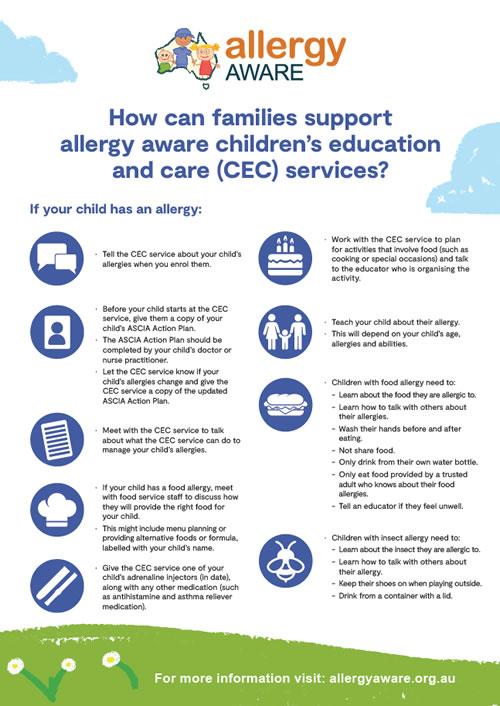- Home
- Children's education and care
- How can families support allergy aware children’s education and care (CEC) services?
How can families support allergy aware children’s education and care (CEC) services?
If your child has an allergy
Tell the children’s education and care service about your child’s allergies when you enrol them.
Before your child starts at the children’s education and care service, give them a copy of your child’s ASCIA Action Plan.
The ASCIA Action Plan should be completed by your child’s doctor or nurse practitioner.
Let the children’s education and care service know if your child’s allergies change and give the children’s education and care service a copy of the updated ASCIA Action Plan.
Meet with the children’s education and care service to talk about what the children’s education and care service can do to manage your child’s allergies.
If your child has a food allergy, meet with food service staff to discuss how they will provide the right food for your child.
This might include menu planning or providing alternative foods or formula, labelled with your child’s name.
Give the children’s education and care service one of your child’s adrenaline injectors (in date), along with any other medication (such as antihistamine and asthma reliever medication).
Work with the children’s education and care service to plan for activities that involve food (such as cooking or special occasions) and talk to the educator who is organising the activity.
Teach your child about their allergy.
This will depend on your child’s age, allergies and abilities.
Children with food allergy need to:
Learn about the food they are allergic to.
Learn how to talk with others about their allergies.
Wash their hands before and after eating.
Not share food.
Only drink from their own water bottle.
Only eat food provided by a trusted adult who knows about their food allergies.
Tell an educator if they feel unwell.
Children with insect allergy need to:
Learn about the insect they are allergic to.
Learn how to talk with others about their allergy.
Keep their shoes on when playing outside.
Drink from a container with a lid.
If your child does not have an allergy your family can support allergy aware children’s education and care services in the following ways:
Help the children’s education and care service look after children with allergies by supporting the ways the children’s education and care service reduces the risk of a child having an allergic reaction.
Talk to your child about how everyone has different health needs and teach them to be respectful of the needs of other children.
Teach your child about how to care for their friends and other children with allergies.
Caring for children with allergies includes:
Washing hands before and after eating.
Not sharing food.
Only drinking from their own water bottle.
Telling an educator if their friend is sick.

Content created November 2023.